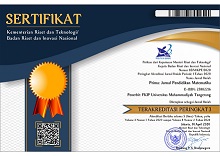IMPLEMENTATION OF THE TPACK FRAMEWORK TO MEASURE INTEGRATION OF TECHNOLOGY, PEDAGOGY AND THE CONTENT OF LECTURERS IN MATHEMATICS EDUCATION
Abstract
One of the obstacles using technology is the lack of teacher understanding of technology, therefore this study aims to determine the understanding of lecturers of mathematics education on the integration of technology in learning using the TPACK (Technological, Pedagogical, Content Knowledge) framework, a few of research that applying TPACK in universities. Furthermore, the both effect of gender and age of teaching on TPACK were analyzed on TPACK using analysis of variance (ANOVA). The results of this study are Power point applications are technologies that are widely used by mathematics education lecturers by 40.9%. PCK, PK and CK components have a strong positive effect on TPACK perceptions of mathematics education lecturers. The average value of TPACK components is TK 3.95; CK 4.01; PK 4.08; 4.02 PCK; TCK 4.04; TPK 4.02; TPACK 3.96. For an in-depth analysis of gender and age of teaching factors on the TPACK component. This study found that gender and duration of teaching was no significant influence between the understanding of mathematics education lecturers and the seven components of TPACK.
Keywords
Full Text:
PDFReferences
Andreou, L. (2017). The Contribution of Technology for Evolving Mathematical Skills in Higher Education. Cyprus International Journal of Management, 19(1), 1–4. Retrieved from http://www.geneva-academy.ch/RULAC/international_judicial_decisions.php?id_state=46
Andy Field. (2009). Discovering Statistics Using SPSS Third Edition. SAGE Publications Ltd (Vol. 622). https://doi.org/10.1007/978-0-387-68969-2_13
Benson, S. N. K., & Ward, C. L. (2013). Teaching with Technology: Using TPACK to Understand Teaching Expertise in Online Higher Education, 48(2), 153–172.
Chai, C.-S., Koh, J.-H. L., & Tsai, C.-C. (2011). Exploring the factor structure of the constructs of Technological, Pedagogical, Content Knowledge (TPACK). The Asia-Pacific Education Researcher, 20(3), 595–603.
Chai, S., Koh, J. H. L., Tsai, C., & Tan, L. L. W. (2011). Modeling primary school pre-service teachers ’ Technological Pedagogical Content Knowledge ( TPACK ) for meaningful learning with information and communication technology ( ICT ). Computers & Education, 57(1), 1184–1193. https://doi.org/10.1016/j.compedu.2011.01.007
Chuang, H.-H., & Ho, C.-J. (2011). An investigation of early childhood teachers’ technological pedagogical content knowledge (TPACK) in Taiwan. Journal of Kirsehir Education Faculty, 12(2), 99–117. Retrieved from http://www.doaj.org/doaj?func=abstract&id=782294&recNo=6&toc=1&uiLanguage=en
Eng, T. S. (2005). The impact of ICT on learning : A review of research. International Education Journal, 6(5), 635–650.
Englund, C., Olofsson, A. D., & Price, L. (2017). Teaching with technology in higher education: understanding conceptual change and development in practice. Higher Education Research and Development, 36(1), 73–87. https://doi.org/10.1080/07294360.2016.1171300
Haapasalo, L. (2017). Adapting mathematics education to the needs of Adapting Mathematics Education to the Needs of ICT. The Electronic Journal of Mathematics and Technology, 1(1), 1–10.
Jang, S., & Tsai, M. (2012). Exploring the TPACK of Taiwanese elementary mathematics and science teachers with respect to use of interactive whiteboards. Computers & Education, 59(2), 327–338. https://doi.org/10.1016/j.compedu.2012.02.003
Keong, C. C., Horani, S., & Daniel, J. (2005). A Study on the Use of ICT in Mathematics Teaching. Malaysian Online Journal of Instructional Technology (MOJIT), 2(3), 43–51.
Koehler, M. J., & Mishra, P. (2009). What Is Technological Pedagogical Content Knowledge ? Contemporary Issues in Technology and Teacher Education, 9(1), 60–70.
Liang, J., Chai, C., Koh, J., Yang, C., & Tsai, C. (2013). Surveying in-service preschool teachers’ technological pedagogical content knowledge. Australasian Journal of Educational Technology, 29(4), 581–594. https://doi.org/http://dx.doi.org/10.14742/ajet.299
Liang, X., & Luo, J. (2016). Micro-lesson Design: A Typical Learning Activity to Develop Pre-service Mathematics Teachers’ TPACK Framework. In Proceedings - 2015 International Conference of Educational Innovation Through Technology, EITT 2015 (Vol. 2, pp. 259–263). https://doi.org/10.1109/EITT.2015.61
Lin, T., Tsai, C., Chai, C. S., & Lee, M. (2013). Identifying Science Teachers ’ Perceptions of Technological Pedagogical and Content Knowledge ( TPACK ). J Sci Educ Technol, 22, 325–336. https://doi.org/10.1007/s10956-012-9396-6
Liu, Q., Zhang, S., & Wang, Q. (2015). Surveying Chinese Teachers ’ Technology , Pedagogy , and Content Knowledge. Journal of Educational Computing Research, 0(152), 1–20. https://doi.org/10.1177/0735633115585929
Otero, V., Peressini, D., Meymaris, K. A., Ford, P., Garvin, T., Harlow, D., … Mears, C. (2005). Integrating technology into teacher education: A critical framework for implementing reform. Journal of Teacher Education, 56(1), 8–23. https://doi.org/10.1177/0022487104272055
Restiana, N. (2018). Evaluasi Profil TPACK untuk Guru Matematika Sekolah Menengah Pertama di Banten. Jurnal Penelitian Pendidikan, 35(2), 167–178.
Sang, G., Tondeur, J., Chai, C. S., & Dong, Y. (2016). Validation and profile of Chinese pre-service teachers’ technological pedagogical content knowledge scale. Asia-Pacific Journal of Teacher Education, 44(1), 49–65. https://doi.org/10.1080/1359866X.2014.960800
Zelkowski, J., Gleason, J., & Cox, D. C. (2013). Validating a Reliable TPACK Instrument for Secondary Mathematics Preservice Teachers. Journal of Research on Technology in Education Developing A, (December 2014), 37–41. https://doi.org/10.1080/15391523.2013.10782618
Zelkowski, J., Gleason, J., Cox, D. C., & Bismarck, S. (2013). Developing and Validating a Reliable TPACK Instrument for Secondary Mathematics Preservice Teachers. Journal of Research on Technology in Education, 46(2), 173–206. https://doi.org/10.1080/15391523.2013.10782618
DOI: http://dx.doi.org/10.31000/prima.v5i2.4158
Article Metrics
Abstract - 2864 PDF - 1388Refbacks
- There are currently no refbacks.
Prima: Jurnal Pendidikan Matematika
Program Studi Pendidikan Matematika
Fakultas Keguruan dan Ilmu Pendidikan
Universitas Muhammadiyah Tangerang
Jl. Perintis Kemerdekaan I/33, Cikokol
Kota Tangerang, Indonesia
e-mail: primajpm@gmail.com
Prima: Jurnal Pendidikan Matematika (p-ISSN: 2579-9827 | e-ISSN: 2580-2216) is licensed under a Creative Commons Attribution 4.0 International License.







